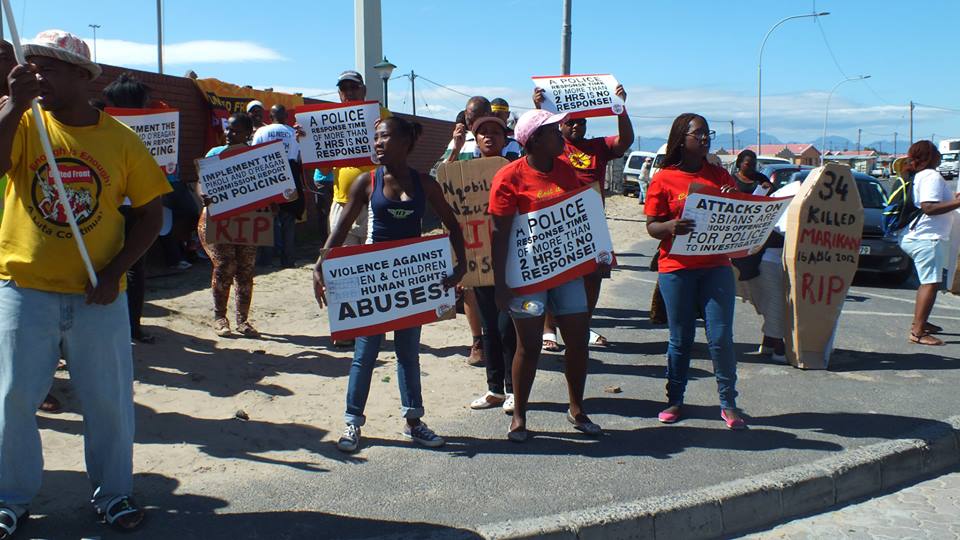Right2Know blames Mashaba, Ramaphosa, Zwelithini for attacks on foreigners
This article below was published by iol.co.za
POLITICS / 2 SEPTEMBER 2019, 8:22PM / BOTHO MOLOSANKWE

Pedestrians pass burnt-out cars on the side of a street on the outskirts of Johannesburg. Picture: AP Photo
Johannesburg – The Right2Know Campaign has blamed the recent attacks on foreigners squarely at the feet of government.
In a statement sent out on Monday amid the continued looting and burning of foreign-owned shops in Gauteng, the organisation blamed Joburg mayor Herman Mashaba, Zulu King Goodwill Zwelithini and president Cyril Ramaphosa.
The organisation said the attacks on non-South Africans can be directly linked to calls by politicians to ‘defend the sovereignty of the state’ and confirms a dangerous emerging trend of “xenophobic populism” which leads to attacks on foreign nationals.
“We recognise that there are many sources of the violence but it is also clear that statements of outrage and condemnation by state officials at all levels (Cabinet, Parliament, the Gauteng Province, SAPS and Metros) fuelled the actions of ordinary citizens who interpreted those statements to be licence to take the law into their own hands. ”
“Senior political leaders find an easy target in the vulnerable Africans seeking to make a new home in South Africa.”
“Indeed, there is a dangerous emerging trend of xenophobic populism that leads to attacks on foreign nationals. In 2015, Zulu King Goodwill Zwelithini’s speech, President Cyril Ramaphosa’s 2019 election campaign pronouncements, the Minister of Health’s comments on the strain placed on health services by foreign migrants, and the xenophobic blaming for Johannesburg’s ill by Mayor Herman Mashaba have been followed by xenophobic attacks in different localities.
“In all these instances, even when not responding to a direct call, political populism is used as justification by instigators and perpetrators who would have been waiting for an opportunity to strike for their own reasons.
The chaos erupted over the weekend after residents went on a rampage following a blaze at a building that claimed three lives in Jeppestown.
Foreign-owned shops were looted, car dealerships were torched and a metro police officer was injured during the chaos.
The chaos spread to other parts of Joburg and throughout the province.
By Monday evening, 91 people had been arrested and many foreign-owned shops remained closed as owners were scared of being attacked. Many others stood empty after being looted and burnt.
Right2Know slammed the attacks, saying they were hate crimes. They said the assaults and the looting of the foreigners’ property just because they were not born in South Africa could never be justified.
“These actions – which are criminal in nature – when combined with the targeting of the victims as belonging to a certain group, becomes a hate crime.
“Apartheid was the experience of being stateless and homeless within one’s home country. Today, we find South Africans showing the same hatred towards fellow Africans that we ourselves suffered not too long ago.
“As hosts of the World Conference Against Racism in 2001, we recognised xenophobia (and the local Afrophobia) as expressions of racism; in 2008 we experienced how the deep roots of internalised oppression enabled us to turn our own experience of racism and oppression into actions that discriminated against, targeted and in some cases killed other Africans living in South Africa.
“It is an issue of national shame that xenophobic violence has become a regular and highly visible feature of South Africa’s political landscape. Outsiders have been regularly attacked, killed and their livelihoods destroyed since the dawn of democracy in 1994.
“Community and local leaders also incite violence against migrants by blaming local economic conditions on the presence of migrants.
“Research evidence further demonstrates that interventions to address xenophobia in the country have failed largely because of the state’s denialism (“it is just crime and not xenophobia”); lack of political will and impunity, all of which encourage perpetrators to strike whenever it suits their interests,” the organisation said.



